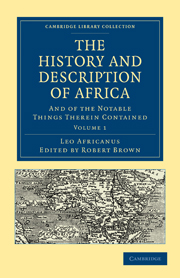Book contents
- Frontmatter
- Contents
- PREFATORY NOTE
- INTRODUCTION
- NORTHERN AFRICA
- BARBARY
- NORTHERN FEZ
- PORY'S MAP OF AFRICA (reduced)
- A GEOGRAPHICAL HISTORIE of AFRICA
- PORY'S DEDICATION TO SIR ROBERT CECIL
- HIS ADDRESS TO THE READER
- HIS GENERAL DESCRIPTION OF AFRICA
- HIS DESCRIPTION OF PLACES UNDESCRIBED BY LEO
- AN APPROBATION OF LEO'S HISTORY BY RICHARD HAKLUYT AND OTHERS
- Notes on Pory's Introductory Matter
- JOHN LEO HIS FIRST BOOK OF THE DESCRIPTION OF AFRICA
- Notes to Book I
HIS ADDRESS TO THE READER
Published online by Cambridge University Press: 05 October 2010
- Frontmatter
- Contents
- PREFATORY NOTE
- INTRODUCTION
- NORTHERN AFRICA
- BARBARY
- NORTHERN FEZ
- PORY'S MAP OF AFRICA (reduced)
- A GEOGRAPHICAL HISTORIE of AFRICA
- PORY'S DEDICATION TO SIR ROBERT CECIL
- HIS ADDRESS TO THE READER
- HIS GENERAL DESCRIPTION OF AFRICA
- HIS DESCRIPTION OF PLACES UNDESCRIBED BY LEO
- AN APPROBATION OF LEO'S HISTORY BY RICHARD HAKLUYT AND OTHERS
- Notes on Pory's Introductory Matter
- JOHN LEO HIS FIRST BOOK OF THE DESCRIPTION OF AFRICA
- Notes to Book I
Summary
Giue me leaue (gentle Readers) if not to present vnto your knowledge, bicause some perhaps may as wel be informed as my selfe; yet, to call to your remembrance, some fewe particulars, concerning this Geographicall Historie, and Iohn Leo the author thereof.
Who albeit by birth a More, and by religion for many yeeres a Mahumetan: yet if you consider his Parentage, Witte, Education, Learning, Emploiments, Trauels, and his conuersion to Christianitie; you shall finde him not altogither vnfit to undertake such an enterprize; nor vnwoorthy to be regarded.
First therefore his Parentage seemeth not to haue bin ignoble: seeing (as in his second booke himselfe testifieth) an Vncle of his was so Honorable a person, and so excellent an Oratour and Poet; that he was sent as a principall Ambassadour, from the king of Fez, to the king of Tombuto.
And whether this our Author were borne at Granada in Spaine, (as it is most likely) or in some part of Africa; certaine it is, that in naturall sharpenes and viuacitie of Wit, he most liuely resembled those great and classicall authours, Pomponius Mela, Iustinus Historicus, Columella, Seneca, Quintilian, Orosius, Prudentius, Martial, Iuuenal, Auicen, &c. reputed all for Spanish writers; as likewise Terentius Afer, Tertullian, Saint Augustine, Victor, Optatus, &c. knowen to be writers of Africa. But amongst great varietie which are to be found in the processe of this notable discourse, I will heere lay before your view one onely patterne of his surpassing wit.
- Type
- Chapter
- Information
- The History and Description of AfricaAnd of the Notable Things Therein Contained, pp. 4 - 11Publisher: Cambridge University PressPrint publication year: 2010First published in: 1896



